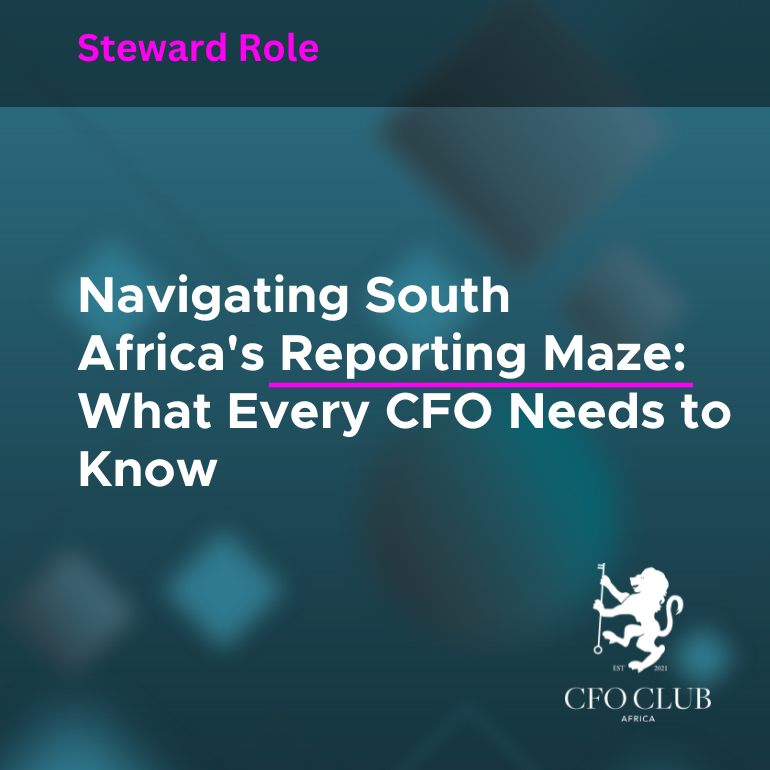Navigating South Africa’s Reporting Maze: What Every CFO Needs to Know
Navigating the complex landscape of regulatory reporting in South Africa can be daunting, especially for CFOs who bear the responsibility of ensuring compliance while also driving strategic financial decisions. The requirements are not just a matter of ticking boxes; they have significant implications for the transparency, credibility, and sustainability of an organisation. This article provides a practical guide to the key regulatory reporting requirements in South Africa, offering actionable insights and examples that CFOs can implement immediately.
Understanding the Regulatory Framework
South Africa’s regulatory environment is governed by a myriad of laws and standards that mandate specific reporting obligations. These include the Companies Act, the Tax Administration Act, the Financial Sector Regulation Act, and the International Financial Reporting Standards (IFRS), among others. Each piece of legislation comes with its own set of requirements, deadlines, and penalties for non-compliance.
Annual Financial Statements (AFS) Submission
Requirement: The Companies Act mandates that all public companies, state-owned companies, and certain private companies with a public interest score above a specified threshold must prepare and submit annual financial statements. These statements must be audited or independently reviewed, depending on the company’s public interest score.
Practical Example: A medium-sized manufacturing company with a public interest score of 350 must ensure that its AFS is audited and submitted to the Companies and Intellectual Property Commission (CIPC) within six months of the financial year-end. Failure to comply can lead to penalties and reputational damage.
Actionable Takeaway: CFOs should establish a robust internal timeline that ensures all financial data is compiled, audited, and submitted well before the statutory deadline. Regular communication with auditors and financial teams is essential to avoid last-minute complications.
Tax Compliance Reporting
Requirement: The Tax Administration Act requires companies to submit various tax returns, including VAT, PAYE, and income tax returns, within specified periods. Additionally, companies must ensure accurate record-keeping for potential audits by the South African Revenue Service (SARS).
Practical Example: A retail company with multiple branches across South Africa must file VAT returns every two months. Missing a deadline or submitting inaccurate returns can result in penalties, interest, and even a detailed SARS audit.
Actionable Takeaway: Implementing an automated tax compliance system that tracks deadlines, calculates liabilities, and generates accurate reports can significantly reduce the risk of errors. Regular staff training on the latest tax regulations is also crucial to ensure ongoing compliance.
Broad-Based Black Economic Empowerment (B-BBEE) Reporting
Requirement: The B-BBEE Act requires companies to submit annual reports on their B-BBEE status. This reporting is critical for businesses seeking government contracts or working with entities that require a certain B-BBEE level.
Practical Example: A construction company aiming for a large government tender must ensure its B-BBEE compliance level is up-to-date and accurately reported. Failure to do so could result in the loss of the tender or a lower B-BBEE rating.
Actionable Takeaway: CFOs should work closely with the HR and procurement departments to ensure that all aspects of B-BBEE compliance, from ownership structures to supplier diversity, are documented and reported accurately. Regular reviews of B-BBEE strategy can help maintain or improve the company’s rating.
Environmental, Social, and Governance (ESG) Reporting
Requirement: While not yet mandatory, ESG reporting is becoming increasingly important for South African companies, particularly those listed on the Johannesburg Stock Exchange (JSE). Companies are expected to disclose their environmental impact, social responsibility initiatives, and governance practices.
Practical Example: A mining company with operations across South Africa may voluntarily report on its carbon emissions, water usage, and community engagement efforts. This proactive approach can enhance the company’s reputation and appeal to environmentally conscious investors.
Actionable Takeaway: CFOs should begin integrating ESG metrics into their regular financial reporting processes. Establishing clear ESG goals and tracking performance against these goals will not only improve transparency but also position the company as a leader in sustainable practices.
Integrated Reporting
Requirement: For companies listed on the JSE, integrated reporting is a mandatory requirement. It involves combining financial and non-financial data to provide a holistic view of the company’s performance, strategy, and value creation.
Practical Example: A telecommunications company listed on the JSE must produce an integrated report that includes financial statements, governance disclosures, risk management strategies, and insights into the company’s future prospects. This report must align with the International Integrated Reporting Framework.
Actionable Takeaway: CFOs should lead the effort in creating an integrated reporting team that includes representatives from finance, sustainability, strategy, and communications. Regular workshops and training on integrated reporting can help ensure that the report is comprehensive and aligned with global best practices.
Conclusion: Ensuring Ongoing Compliance
Staying compliant with South Africa’s regulatory reporting requirements is not a one-time effort but an ongoing responsibility. CFOs must be proactive in understanding the evolving regulatory landscape and implementing systems and processes that ensure accurate and timely reporting. By doing so, they not only avoid penalties but also enhance the company’s credibility and stakeholder trust.
Final Thought: As a CFO, take the time to review your current reporting processes. Identify any gaps, invest in the necessary tools and training, and foster a culture of compliance within your finance team. Regulatory reporting is not just a statutory obligation; it is a critical component of your company’s overall strategy and success.

